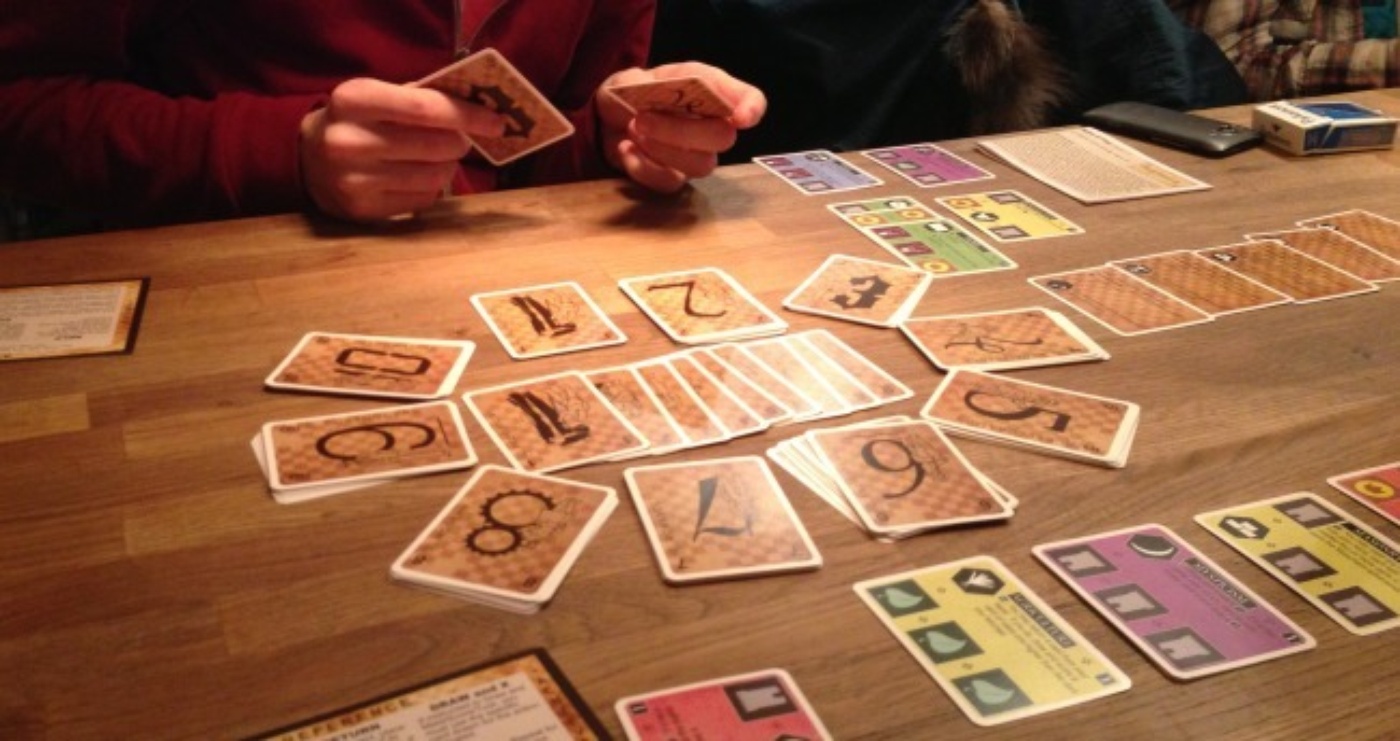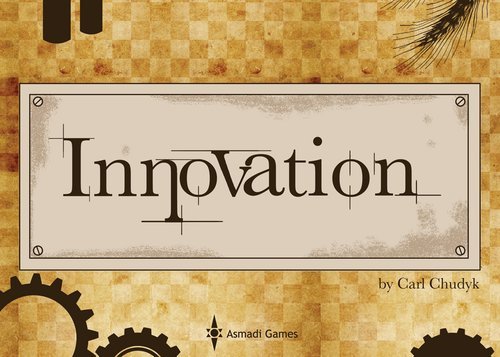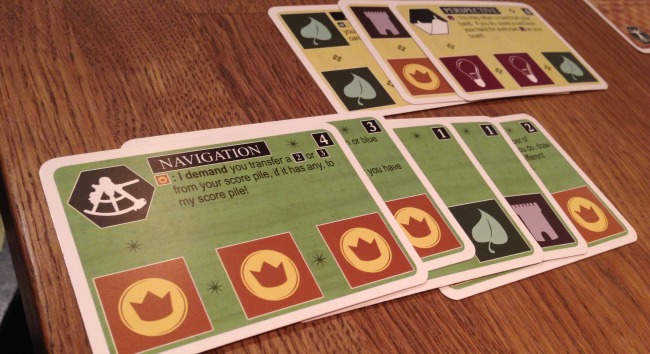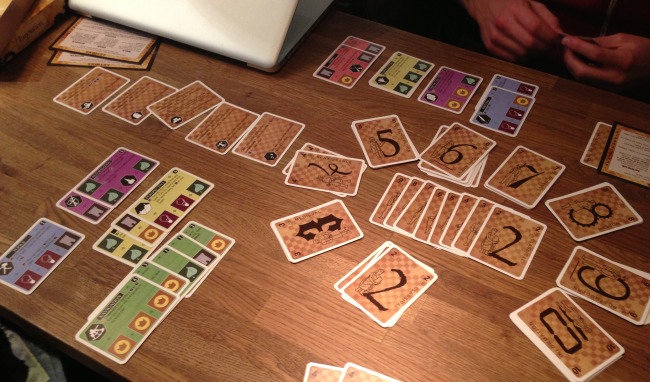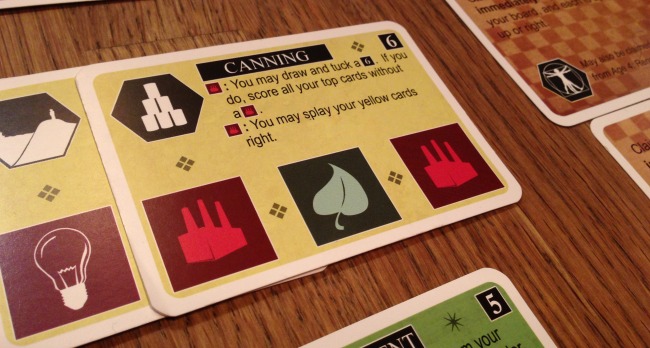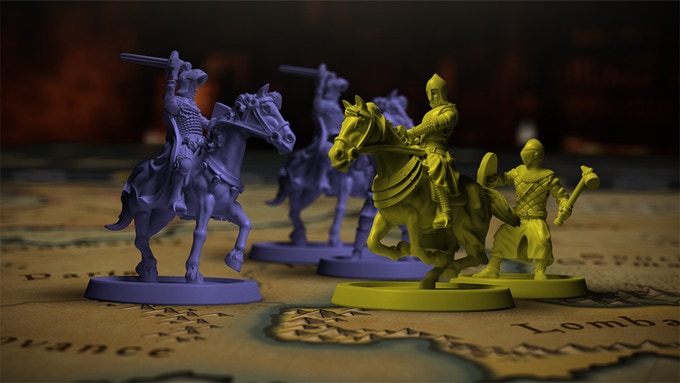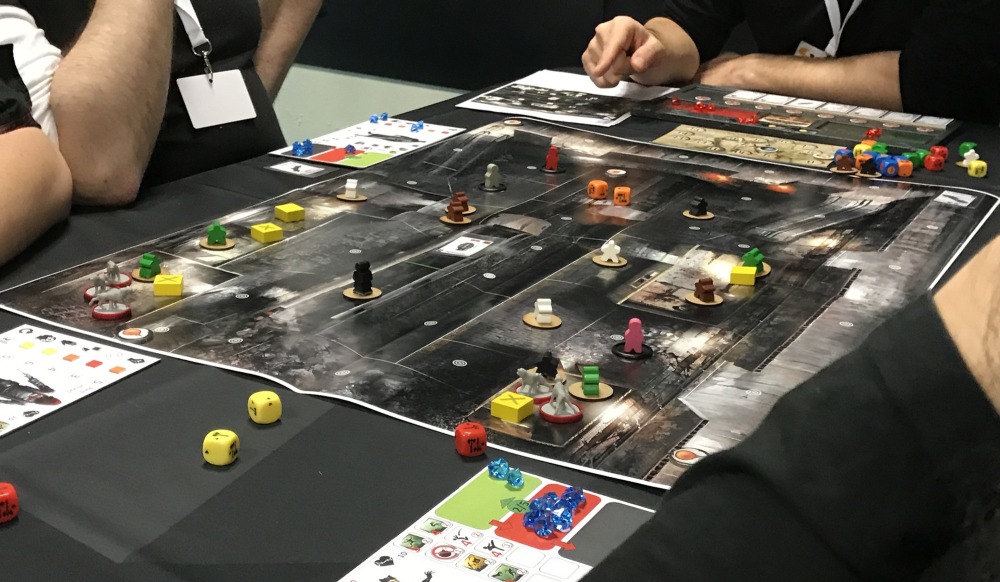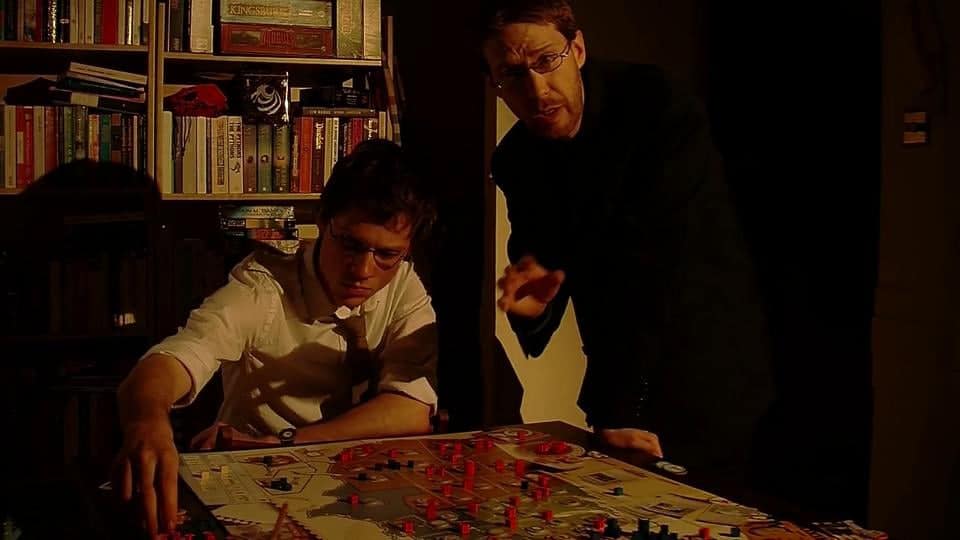Quinns: The first edition of Innovation, a card game ranked in Board Game Geek’s top 150 games of ALL TIME, looks – as you can see – supernaturally boring.
The tiny box looks like it should contain soviet suppositories, and inside it you’ll find 110 cards in the same hospitalised colour (Lung? Nicotine?). The deathly manual informs you that every one of these cards is an “innovation”, from archery to automobiles, and 2-4 players will use them to race from one end of history to the other.
Let’s say you agree to play Innovation, even though it’s clearly not your thing. That experience can be compared to going to drink a tall glass of dirty water, and discovering it’s neat whisky.
Here’s that box, which scientists confirmed to me actually radiates misery:
…and just let me say again that this game took the top of my head off. Let’s take a look.
And let’s start with some RULES:
A turn in Innovation usually sees you placing an Innovation in front of you from your hand. Boom. Your civilisation’s discovered The Wheel, or Road Building, Sailing, Jersey Shore, whatever.
SOME MORE RULES:
Cards only come in five colours. Cover up an existing colour, your civilisation loses the benefit from that innovation.
Yes! Every card has a special ability that you can use instead of drawing or playing cards, with the twist that other players can use that action too if they have enough matching icons in their own society.
In other words, in addition to the race through history, you’re all racing to be the toughest, smartest, contented or richest people (and later, the most industrialised, the most connected).
There’s your set-up. That doesn’t convey the appeal, though, which is buried deep in your first match.
So let’s talk you through your first match!
5 Minutes In:
You: OK. Wait. So I can draw a card, and then place it? Like… this? I don’t get this at all.
10 Minutes In:
You: Hang on. How do I actually win?
Me: I told you! You have to get points.
You: How do I get points?
Me: Some innovations let you earn points.
You: WHERE ARE THOSE INNOVATIONS
Me: WE’RE IN THE STONE AGE RIGHT NOW. THERE IS NO CONCEPT OF POINTS.
You: I don’t get this AT ALL
15 Minutes In:
You: This card says it lets me splay. What does that mean?
Me: It means you can build on your society’s legacy. You take one of your coloured stacks of innovations and fan it out, getting you all those icons.
You: But wait. If I do that, I have more commerce than anyone else, and… I can use Navigation to take some of your points.
Me: Uh-oh.
You: What stops me from doing that every single turn?
Me: …well, nothing.
40 Minutes In:
You: RIGHT suck on this I’m going to use Physics to claim three cards off of the Modern era—
Me: Jesus christ!
You: —and put them all in my hand and then Agriculture to put them all back and take two of yours—
Me: What?!
You: —which I’ll immediately meld with my red stack.
Me: Impossible!
*I flip the table, a fistfight breaks out*
Here’s the thing about Innovation that isn’t clear from the box, the manual, the cards or the outset of a game.
Every single card anyone places on the table is a gear or piston in an increasingly dangerous machine that, 15 minutes in, is spinning so fast that you’re scared you’ll get your shirt caught in its metaphorical fanbelts.
Here’s the part where I lay down the appeal of Innovation.
ONE! Each of the game’s 10 eras are an order of magnitude more powerful than the first.
Every other turn you’re drawing cards or discovering combos which launch you onwards through eras and achievements with stomach-flattening force. This gives the game an addicting pace, and an agility that means no-one’s ever out of the running.
TWO! You’re playing against each other.
Powers are mandatory for everyone with more icons than the owner, and sometimes forcing your opponents to draw cards, score them or discard them can be exactly what they don’t need. So, a good play in Innovation is advancing yourself while wedging some epoch-splitting wrench in your opponent’s works.
This means that unlike so many building games, you’re actually playing with your friends.
THREE! There’s real tension from the possibility of being ruined. Don’t pay attention, and your civilisation might smash against a timeline like a car spinning off into a wall.
How might you do that? Well, with a card like Canning.
A card that lets you score ALL the top Innovations of your people. In other words, everything you’ve worked for up to this point is repurposed.
“Great,” I thought. “Perfect! Absolutely no downside here. No sir.”
I only realised after I’d done this TWICE that I was now leading a civilisation of people who could no longer tie their shoes. I can only presume my people canned literally everything, including their books and can openers.
Innovation probably deserves its place at rank #149 of Board Game Geek. There’s a definite sense of “Who made this, and how many brains did they have?” For a quick card game, it’s distressingly smart.
So, would I recommend you rush out and buy Innovation RIGHT NOW?
…
No I wouldn’t, is the weird bit.
Broadly, Paul and I recommend games so transparently fun as to make onlookers envious. Today’s scene is bursting with games full of heart, wit, colour, humour and stories.
Innovation, on the other hand, requires you to do the heavy lifting. You have to try it, you have to make all the thematic excuses as to why each innovation has the power it does (Refrigeration is an updated version of Archery, for example), and you have to realise how clever the game is. Frankly, we’d rather point you towards something that speaks of the future of board gaming, instead of its past.
…Something a bit more innovative, I suppose.
This isn’t a “Do not buy”, just a “Proceed with care”. It’s getting to the point now where people that find SU&SD have their breath (and money) taken away by how many staggering games there are out there. From this point on, expect Paul and myself to be a little more cautious with our recommendations.

